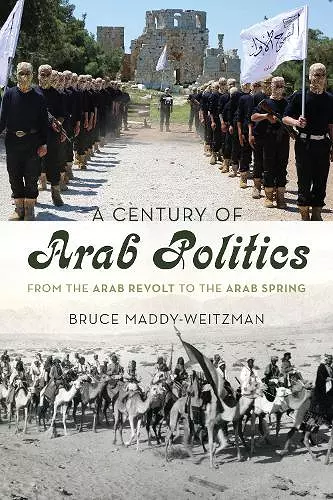A Century of Arab Politics
From the Arab Revolt to the Arab Spring
Format:Paperback
Publisher:Rowman & Littlefield
Published:15th Dec '15
Currently unavailable, and unfortunately no date known when it will be back
This paperback is available in another edition too:
- Hardback£89.00(9781442236912)

From the “Great Arab Revolt” against Ottoman rule in World War I to the upheavals of the Arab Spring, this text analyzes a century of modern Arab history through the lens of three intertwined notions: the idea of a single Arab nation, the reality of multiple Arab states, and the competition between them over both concrete and symbolic interests. These concepts are presented against the background of Great Power involvement in the region, regional issues such as the Arab-Israeli conflict and the Iran-Iraq war, and the rise of political Islam. The evolution of regional Arab politics is examined from its infancy at the beginning of the 20th century to the profound challenges posed by the upheavals of the Arab Spring, and through the emergence of multiple Arab states organized under the League of Arab States, the pan-Arab heyday of Gamal Abdel Nasser between 1955 and 1967, and the subsequent consolidation of a multi-polar Arab state system. This history highlights the changing nature of modern Arab identity, the achievements and shortcomings of Arab state formation processes, and the influence of enduring communal, tribal, religious and ethnic identities on the modern Arab order. Altogether, these factors help explain contemporary Arab realities and why the Arab nationalist dream of achieving power and prosperity in line with an idealized image of the past, has proven elusive. This failure, in turn, has fueled both the recent upheavals and limited the prospects for successful outcomes. This broad and readable synthesis covers the political, economic, social, and cultural history of the Arab region. By reexamining what “being Arab” means today, politically and culturally, it will be a valuable text to students seeking to understand the modern Middle East.
Maddy-Weitzman seeks to synthesize the complex history of the contemporary Arab Middle East, focusing on Arab identity and Arab nationalism. Using mostly English-language sources, the author argues that Arab identity evolved out of ‘Arabism,’ or Arabs’ consciousness of being distinct from the Ottomans ruling them, before being articulated into a more structured vision of a fractured nation under the dominion of Western powers that needed to reassemble its fragments into an independent union. The constantly thwarted ‘dream’ of unity is seen as the bedrock of ‘Arab’ politics, the book's object. Wars with Israel loom large, as each defeat pointed to the hollowness of the assumed unity project. The emphasis on ‘Arab’ nationalism as an explanatory concept obscures the role played by imperialism (referred to neutrally as ‘domination’), either in the ‘weakness’ of Arab states the author notes, or Western powers’ apparent fear of Arab unity. The book's tone is restrained, the style is clear, and where details are given, some sections are informative. * CHOICE *
[The book] both reprises and provides many helpful views of things one might well have forgotten. * Asian Affairs *
Bruce Maddy-Weitzman’s extraordinary book could not have come at a better time. We are now 100 years removed from the Arab Revolt, a defining event in shaping the Middle East regional order of the last century. The book succeeds in helping us digest the vast scope of changes in the region over that time, particularly the rise and fall of Arab nationalism. -- Joel Migdal, Henry M. Jackson School of International Studies, University of Washington, Seattle
ISBN: 9781442236929
Dimensions: 226mm x 151mm x 22mm
Weight: 449g
226 pages